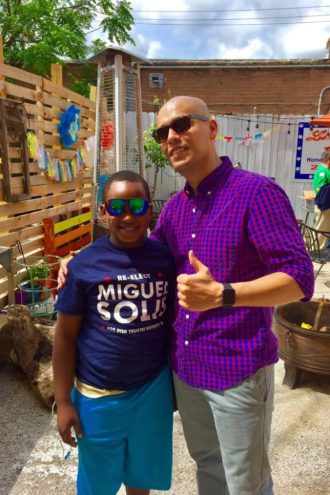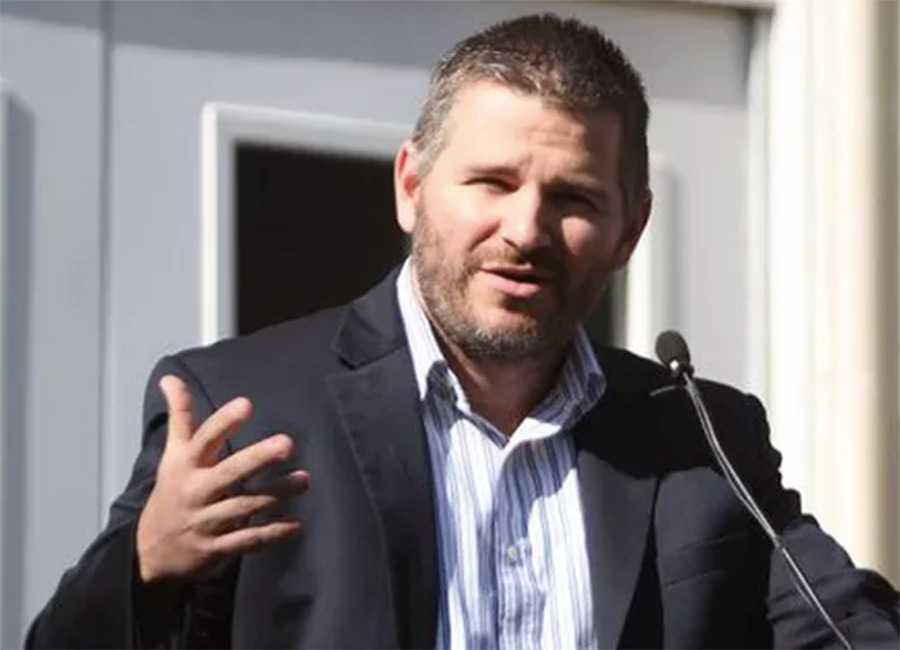The first time Mike Koprowski came to chat in the office, I asked him what was so attractive about tackling a citywide housing policy in a city that has never had one. Education brought him here from Tennessee in 2014. He took a job leading Dallas ISD’s innovative programs like Solar Prep, the all-girl’s STEAM school for students of all incomes. When he started analyzing the makeup of the district, he noted two extremes: the since-shuttered George Washington Carver Elementary School where, he said, every one of its students lived in public housing, and the “donut hole” that is Highland Park and its upper-class demographics, smack-dab in the middle of what anyone not from here could reasonably expect to be Dallas ISD’s geography. The difference between the two shook him.
“The question is,” he asked, “can we be separate and equal?”
He was already of the belief that housing and education intersected, but this helped localize it. Since then, he’s pushed to have the district reckon with the lasting impacts of segregation and redlining on its student population. Earlier this year, trustees Miguel Solis and Joyce Foreman—who typically find themselves on opposite ends of votes—coauthored an equity resolution that put these things into the record.
Koprowski left the district in early 2017 to focus on housing. He started a nonprofit known as Opportunity Dallas, with the goal of bringing together stakeholders from all over the city—apartment complex owners and housing voucher recipients, developers and affordable housing activists—to produce a series of policy recommendations that the city could turn to as it creates its own housing policy. It revealed those recommendations earlier this month.
Yesterday, Koprowski announced he’s stepping down as the organization’s director and moving to Washington, D.C., where he has accepted a job as the national campaign director of a housing campaign that will “make catalytic investments in activities that ensure stable housing in thriving communities.”
In a long letter announcing his departure, Koprowski says he hopes his new opportunity would give him a chance to influence policy at the national level and to have an impact in deeply segregated cities like Dallas and many others, where affordable housing is disappearing and many neighborhoods lack investment.
“It’s a very tough decision to leave Dallas, which welcomed my family with open arms and supported me throughout my efforts at Dallas ISD and Opportunity Dallas. We cherish the relationships we’ve built, and there is much we’ll miss about Dallas,” he wrote. “My hope is that effective federal housing policies, which are a pivotal part of the solution, can both reinforce and accelerate local efforts in cities across the country, including Dallas.”
The 32-member task force—which is chaired by Solis—developed a 28-point strategy that they believe will create mixed income neighborhoods that allow for development without mass displacement. It’s a big, complex goal, one that, if following the recommendations, will require sacrifice from some on the City Council. Not all districts in the city need the same amount, or the same type, of investment or incentives, they argue. Typically, Dallas has done things in an ad-hoc manner, spreading public dollars around like peanut butter on toast. Opportunity Dallas says that won’t solve generational poverty. For proof, Dallas has seen a jump of 42 percent in its poverty rate over the last 15 years, the most of any big American city.

You can see it in the Census’ ZIP Code data for median household income, which, for a family of four in Dallas is $45,215: 75232, a rectangle stretching down from Loop 12 to below I-20 between Hampton and Interstate 35, is $28,682; 75215, near Fair Park, is $26,316; 75216, in South Dallas below the zoo, is $24,481. When poverty gets concentrated in these neighborhoods, nearly every metric craters: health, income, education.
“The maps of inequality and segregation of today look a heck of a lot like they did 20 or 30 years ago,” he said. “It hasn’t changed at the scale and magnitude we need it to change.”
Opportunity Dallas’ resolution calls upon the city to develop a Neighborhood Change Index, which would identify areas that are at risk of gentrifying and uprooting the existing community. Think what we saw in West Dallas in the years after the Calatrava bridge and Trinity Groves. It calls for the city to freeze property taxes for existing residents. It offers up homestead preservation districts and homebuyer assistance programs. It also identifies the things that keep lower incomes away from communities that exist near jobs and other services—voucher discrimination, lack of fair housing, low income housing concentrations, limited supply of affordable units—and calls upon the city to draw up strategies to make these areas more inclusive.
It introduces the potential for accessory dwelling units, better known as granny flats. It floats the possibility of inclusionary zoning—the city provides specific incentives for developers if they build enough affordable units in one of its “high opportunity” areas. It urges the city to sell some of the land it owns to developers who would build mixed-use developments, including housing for all incomes. State law, after all, allows municipalities to sell property below market value if it’s for a “public good.”
“We wanted to articulate what good local housing policy is, unconstrained by the politics and by the bureaucracy,” Koprowski said. “What is good local policy that will move the needle on the problems we’ve outlined?”
Koprowski probably wouldn’t admit it, but his pronouncements have been some of the most public calls for a housing policy that the city has seen. He has presented his case to the City Council, arguing that segregation birthed poverty. He has worked with city staff. And he was finally ready for his moment, armed with policy recommendations that the task force ironed out over about five months. His goals are ambitious, but his execution was humble. When asked about his next plans for the nonprofit’s resolutions, he basically said he’d proselytize in front of anyone who would listen. He’d answer questions. He’d be a resource. Solis, as an elected school trustee, likes to emphasize how elected officials need specific recommendations on policy decisions.
“As a policy maker, I get people who come to me all the time and say, ‘You should fund Montessori schools more. You should create more opportunities for choice in DISD.’ But there is never any meat to those recommendations,” he says. “We wanted to make sure there wasn’t a whole lot of wishing to do. Here are research-based practices or practices in place in other communities. … That, for a policy maker, is like gold.”
The timing was right. The city had just unveiled its Market Value Analysis, a data tool that provides demographic information about all the neighborhoods in Dallas, to help the city make better decisions rooted in data about where and how to invest its money. And Raquel Favela, the city’s chief of economic development and neighborhood services, is overseeing an outreach initiative to help inform the city’s own forthcoming housing policy that, in December, she described thusly: “Anybody who is engaged in the development of housing, anyone who is financing housing, anyone who is a user of housing, people who are renters of housing who have tried to buy housing.” It’s expected by the spring.
Koprowski oversaw the design of a wish list of housing recommendations, one free of the political and bureaucratic morass that comes when those things smash into City Hall.
The road forward won’t be easy. It’s hard not to think back to the January committee meeting when the Council was briefed on some of the findings of the Market Value Analysis. Councilman Dwaine Caraway wondered how to fix some of the problem areas in his southern Dallas district. Councilman Kevin Felder was upset that the analysis zoned in on Buckner Terrace instead of the neighborhoods closer to Fair Park as having more potential for investment. It didn’t match up with what he saw himself, he argued.
Which is the nature of Dallas’ 14 district makeup. The council members will fight for their constituents’ neighborhoods based on what they see and hear. Opportunity Dallas instead asks for a little research-based sacrifice, to really look at the success rate of ad-hoc investment throughout the city and determine whether that’s the best way forward. It’s asking the Council to look at the hard data. It’s not unlike what the urbanist Richard Florida told the City Council yesterday during a retreat. The Dallas Morning News’ Robert Wilonsky detailed his message. Unfettered commercial success in the city has created a rash of housing and income inequality. Now is the time to act, however difficult and foreign it may be.
Solis will remain chair of the task force. Kelsey Beachner will continue as operations director, and Paula Blackmon will continue to consult. They’ll all help search for a new executive director.
Koprowski, in his farewell statement, notes that people are now talking about these things. There are media reports, town hall meetings, calls for change around the horseshoe. He’ll be joining a housing campaign that was started by the National Low Income Housing Coalition and has the support of nonprofits in education, mental health, anti-poverty, as well a slew of big-name backers like the Annie E. Casey Foundation, the Bill & Melinda Gates Foundation, and the John D. and Catherine T. MacArthur Foundation. Called the Funders for Housing and Opportunity, it has already received nearly $5 million in funding. He says it is a way to take his ideas national.
For now, the city has this: “For the first time,” Koprowski wrote, “Dallas has a concrete policy vision for how to promote mixed-income and affordable housing at scale.”






